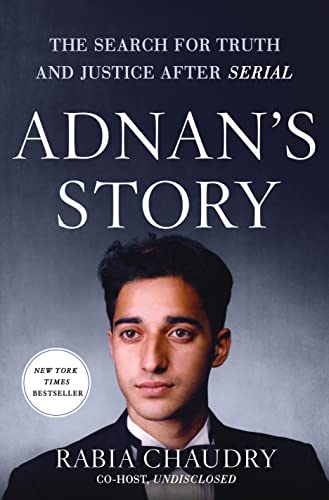Adnan's Story: The Search for Truth and Justice After Serial

“As stories of wrongful convictions go, Adnan’s Story is hands-down a certain winner.”
The plot of Adnan’s Story unfolds like a thriller, except that by the end of the story, we still don’t know who killed Hae Min Lee, a teenager from Woodlawn High School in Baltimore. Hae disappeared on January 13, 1999, and her body was discovered in nearby Leakin Park some weeks later. Adnan Syed, Hae’s ex-boyfriend, was arrested for her murder soon after.
Rabia Chaudry, an accomplished attorney, a senior fellow at the U.S. Institute of Peace, and the co-host of the podcast Undisclosed, is sure that her close family friend Adnan is not Hae’s murderer. And she has been sure of this for the last 17 years—so sure, in fact, that she has labored tirelessly for Adnan’s release from prison, where he has been languishing since he was first arrested for Hae’s murder in February 1999.
The case attracted international attention in 2014, when the acclaimed podcast Serial, hosted by radio producer Sarah Koenig, was aired. Serial, which covered the case in 12 riveting episodes, tantalized its audiences with evidence, testimony, and interviews that cast reasonable doubt on Adnan’s involvement in Hae’s murder, although it stopped short of actually declaring Adnan to be innocent, much to Ms. Chaudry’s disappointment and dismay. She remained dissatisfied with Koenig’s presentation of the story, feeling that there needed to be an account that also told the story from the “perspective of the community, Adnan’s family, Adnan, myself.”
Adnan’s Story: The Search for Truth and Justice after Serial is just that: the remarkable account of Ms. Chaudry’s efforts to conclusively establish Adnan’s innocence, efforts that as recently as June 30, 2016, led the judge presiding over Adnan’s case to declare that Adnan’s original defense attorney had overlooked some important details when she represented him during his trial in 2000.
Judge Martin P. Welch has called for Adnan’s convictions to be vacated and a new trial to be conducted, a major, long-awaited victory for Adnan’s supporters. As of this writing, Adnan’s fate continues to hang in the balance, and only the months to come will reveal how this thriller finally plays out.
As stories of wrongful convictions go, Adnan’s Story is hands down a certain winner. It is a meticulously researched, engagingly written account of an intense high-school romance that ended tragically. It displays both psychological depth and legal acumen. But it is not just the crime and punishment drama that makes this book so riveting. Its power and appeal derive from Ms. Chaudry’s artful deconstruction of a powerful narrative that is working its way into the hearts and minds of this nation’s citizens today: the narrative of Islamophobia.
Ms. Chaudry, a Pakistani American Muslim herself, writes in chapter nine: “Since that terrible September morning in New York and DC, when nineteen Muslim hijackers slammed commercial planes into the crowded Twin Towers and the Pentagon, killing thousands, Muslims in America have felt besieged . . . [I]t is completely by design that public bashing, humiliation, and outright reviling of Islam and Muslims is par for the course in the media and among our political leadership. Islamophobia is a bigotry everyone is comfortable with.”
She expertly demonstrates how Adnan’s case was, from the very beginning, treated differently because of Adnan’s religion and ethnicity: Adnan is a Pakistani Muslim who was born and raised in the United States. She shows how negative stereotypes of Muslims and of Islam shaped early investigations, both by the police and by an independent agency, and how the opening argument used during Adnan’s trial by his own defense attorney, Cristina Gutierrez, reinforced such stereotypes.
In the process, Ms. Chaudry provides a heartfelt, first-hand, insider’s portrayal of the Muslim community in Baltimore, situating Adnan and Hae’s romance within the context of that community’s taboos and attitudes toward dating, love, and premarital sex.
Writing with empathy of a community caught in the crosshairs, she depicts the double-bind in which children of South Asian immigrants often find themselves: while they are raised with conservative values by their parents, they often subscribe to more Western attitudes about sex and relationships. Their lives are a “cultural hodgepodge”: “Being raised in the West adds one more dimension to an already complicated but very much culturally egalitarian identity,” she writes.
Against this cultural backdrop and by exhaustively reconstructing past events and drawing upon all the existing documentary evidence, including police transcripts, diaries, letters, interviews with witnesses, and autobiographical commentaries by Adnan himself, the author offers a remarkable rebuttal of the decisions and judgments made by law enforcement officials and state prosecutors during the fateful period between Adnan’s arrest and his conviction.
She builds a convincing case for Adnan’s innocence, arguing that Adnan is the victim of a poorly constructed defense, insufficient—and flawed—material evidence, and deeply entrenched racism and Islamophobia within the American criminal justice system. She also shows how the skewed focus on Adnan as a suspect has left Hae’s murder tragically unsolved to this very day.
Adnan’s Story comes out at an opportune moment in American politics and history when the flames of Islamophobia are being remorselessly fanned by Donald Trump and his presidential campaign. Whether or not you were a fan of season 1 of Serial, Adnan’s Story is sure to enthrall as well as educate you about Islamic values and Islamophobia in the United States today.